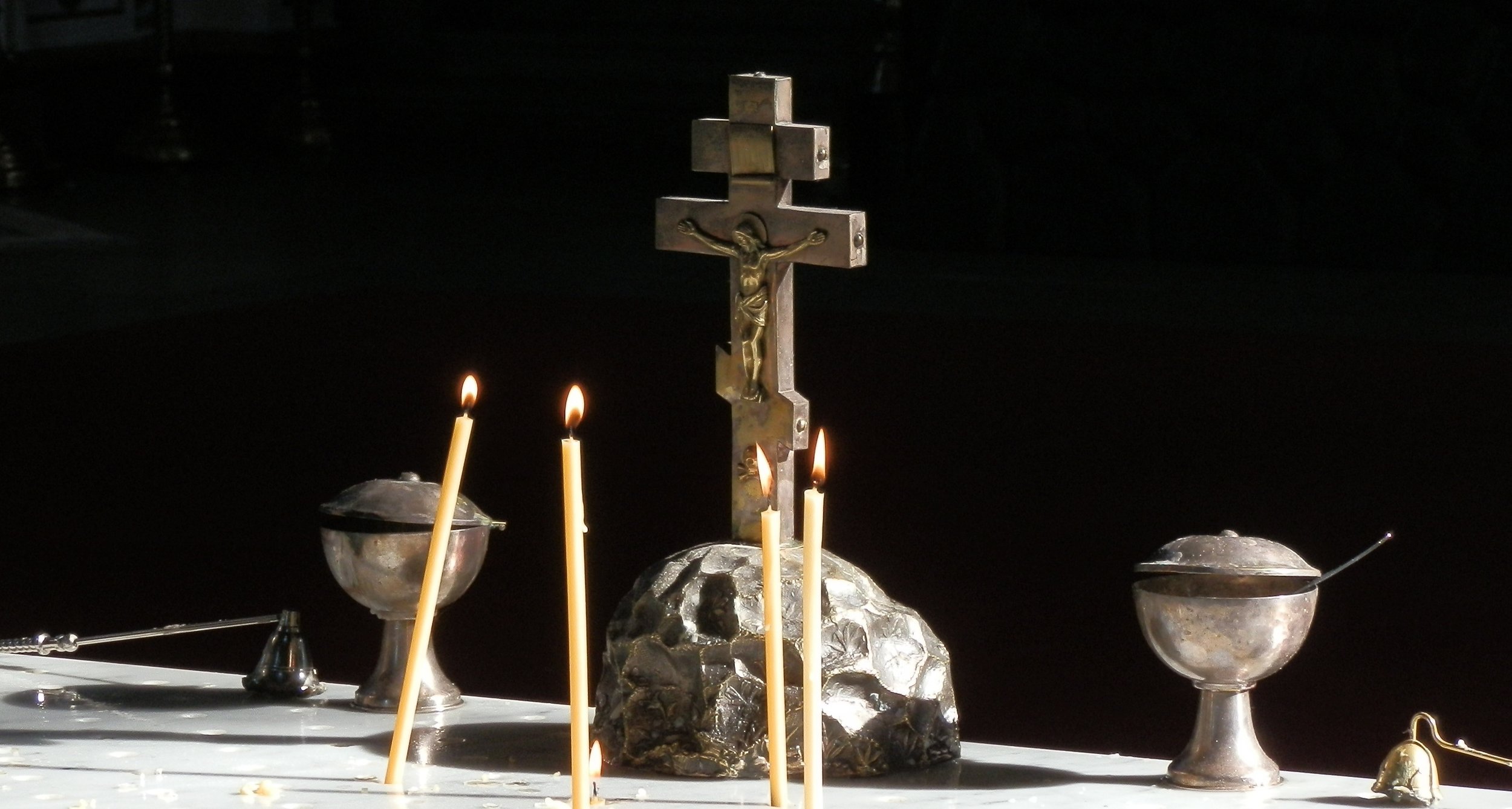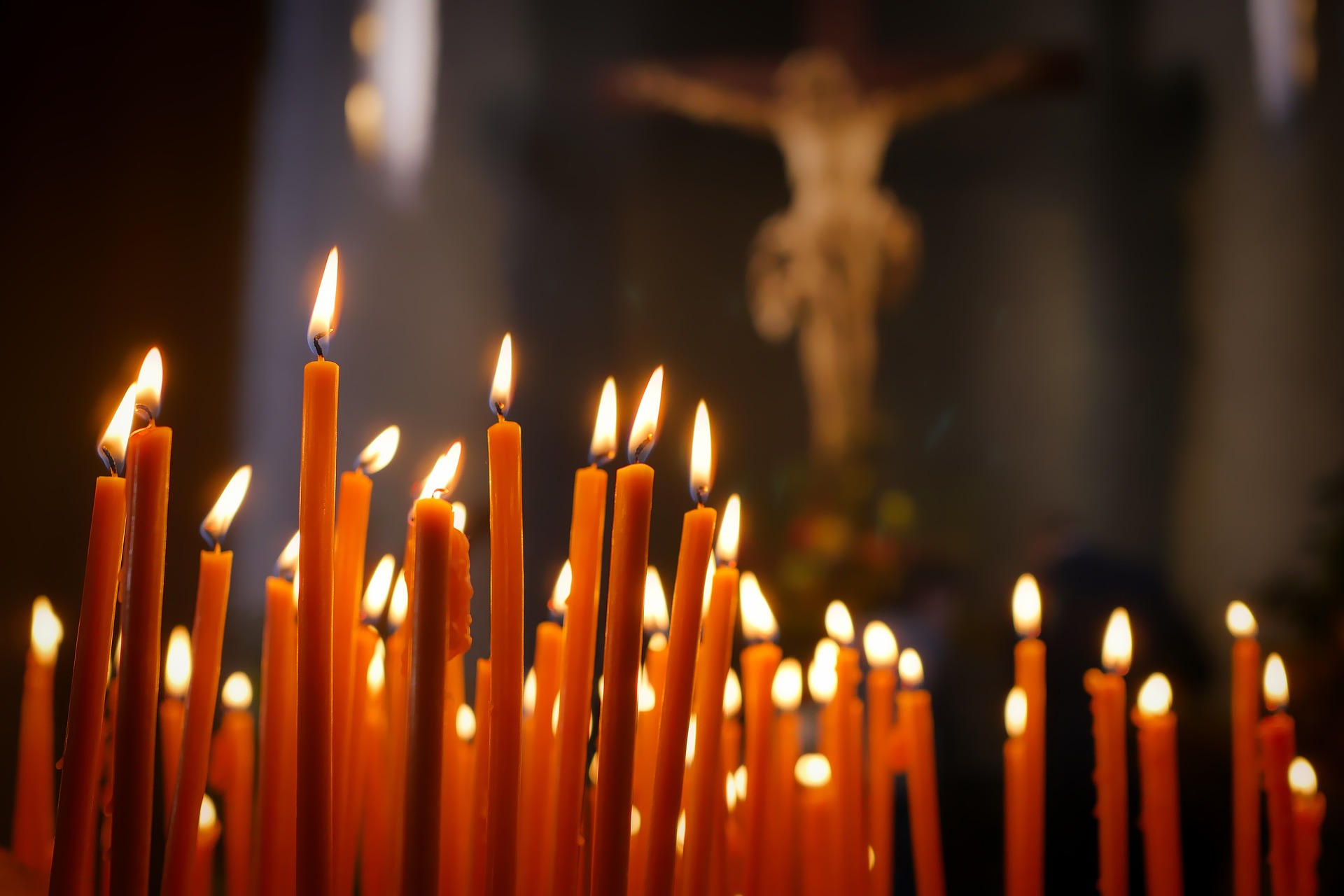Healing Atonement
John of Damascus (c.675 - 749 AD)
An old clay oil lamp from Nazareth, Israel. Photo credit: Olivia Armstrong.
The Writings of John of Damascus
John of Damascus, Exposition on the Orthodox Faith book 1, chapter 9 does a fascinating etymology of the title "God" as linked to the verbs "to run" (as in courses through all things) and "to burn" (as in consuming all evil)
John of Damascus, Exposition on the Orthodox Faith book 2, chapter 4 writes:
"All wickedness, then, and all impure passions are the work of their mind. But while the liberty to attack man has been granted to them, they have not the strength to over master any one: for we have it in our power to receive or not to receive the attack. herefore there has been prepared for the devil and his demons, and those who follow him, fire unquenchable and everlasting punishment. Note, further, that what in the case of man is death is a fall in the case of angels. For after the fall there is no possibility of repentance for them, just as after death there is for men no repentance."
John of Damascus, Exposition on the Orthodox Faith book 3, chapters 8, 11, 15, 17, 19 explains the Son of God taking human nature as fire inhabiting a coal or iron
John of Damascus, Exposition on the Orthodox Faith book 4, chapter 9 explains Jesus' baptism: "Now He is baptized not as Himself requiring purification but as making my purification His own... that He may wash away sin and bury all the old Adam in water"
John of Damascus, Exposition on the Orthodox Faith book 4, chapter 13 explains Jesus' incarnation and atonement in healing terms: "For since He bestowed on us His own image and His own spirit and we did not keep them safe, He took Himself a share in our poor and weak nature, in order that He might cleanse us and make us incorruptible, and establish us once more as partakers of His divinity"
John of Damascus, Exposition on the Orthodox Faith book 4, chapter 18 denies that the Father forsook the Son, which is a foundation of penal substitution: "For neither as God nor as man was He ever forsaken by the Father"
John of Damascus, Exposition on the Orthodox Faith book 4, chapter 19 explains why God is not the cause of evil; God did not require our sin, contrary to the Westminster Confession wherein God required double predestination so He could show two faces
John of Damascus, Exposition on the Orthodox Faith book 4, chapter 27 writes:
"We shall therefore rise again, our souls being once more united with our bodies, now made incorruptible and having put off corruption, and we shall stand beside the awful judgment-seat of Christ: and the devil and his demons and the man that is his, that is the Antichrist and the impious and the sinful, will be given over to everlasting fire: not material fire like our fire, but such fire as God would know. But those who have done good will shine forth as the sun with the angels into life eternal, with our Lord Jesus Christ, ever seeing Him and being in His sight and deriving unceasing joy from Him, praising Him with the Father and the Holy Spirit throughout the limitless ages of ages."
John of Damascus, On Holy Images, p.17 says, "I honor all matter, and venerate it. Through it, filled, as it were, with a divine power and grace, my salvation has come to me. Was the three-times happy and blessed wood of the Cross not matter? Was the sacred and holy mountain of Calvary not matter? What of the life-giving rock, the Holy Tomb, the source of our resurrection — was it not matter? Is the holy book of the Gospels not matter? Is the blessed table which gives us the Bread of Life not matter? Are the gold and silver, out of which crosses and altar-plate and chalices are made not matter? And before all these things, is not the body and blood of our Lord matter? Either stop venerating all these things, or submit to the tradition of the Church in the venerating of images, honoring God and his friends, and following in this the grace of the Holy Spirit. Do not despise matter, for it is not despicable. Nothing that God has made is. Only that which does not come from God is despicable — our own invention, the spontaneous decision to disregard the law of human nature, i.e., sin."
Other Resources on John of Damascus
Charles C. Twombly, Perichoresis, Personhood, and Salvation in John of Damascus. Wipf and Stock Publishers | Amazon book, 2015.
Vassa Kontouma, John of Damascus. Routledge | Amazon page, Jun 30, 2020.
“For more than five hundred years the life and work of John of Damascus (c.655 - c.745) have been the subject of a very extensive literature, scholarly and popular, in which it is often difficult to get one’s bearings. Through the studies included here (of which 6 appear in a translation into English made specially for this volume), Vassa Kontouma provides a critical review of this literature and attempts to answer several open questions: the author and date of composition of the official Life of John, the philosophical significance of the Dialectica (a study which has its first publication here), the original structure of the Exposition of the Orthodox faith, the identity of ps.-Cyril, the authenticity of the Letter on Great Lent, and questions of Mariology. She also opens new vistas for research along four main lines: the life of John of Damascus and its sources, Neochalcedonian philosophy, systematic theology in Byzantium, and Christian practices under the Umayyads.”
Fr. Maximos Constas, Did Christ Repent? The Greek Fathers and the Vicarious Repentance of Christ (Part 3). The Pappas Patristics Institute, Oct 21, 2021. Constas argues for the unfallen humanity view, and argues that John of Damascus held it.
Norman Russell, The Christology of John of Damascus. The Pappas Patristic Institute, Nov 4, 2022. Russell notes that John models his work on Gregory of Nyssa’s Catechetical Lectures. John argues for a single subject of the Word, with a real union of natures, and a perichoresis that is asymmetrical: the divine nature is not penetrated by anything, but penetrates the human nature.
Scott Ables, John of Damascus: More Than a Compiler. Brill Academic | Amazon page, Dec 2022.
Sources of Atonement Theology
These resources explore the foundation of “Medical Substitution” as the best understanding of the Bible, and the original understanding of the church. There are also links to books, web articles, etc. from representatives of the three broad Christian traditions.





